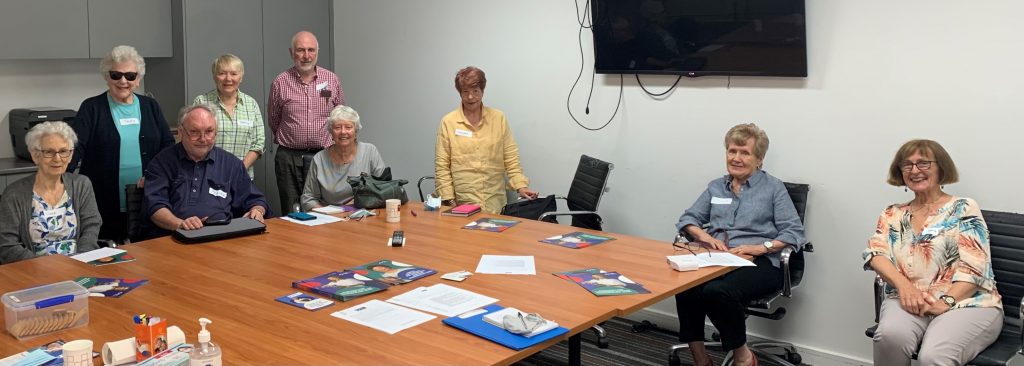What is peer support?
Living with macular disease can be isolating. MDFA’s peer support might be the answer.
You can always seek help from an eye health professional or a counsellor. But sharing your experiences with people who understand what you’re going through may be more comforting.
MDFA offers Peer to Peer phone calls as well as peer support groups, both face-to-face and online.
These are the peer support services we currently offer:
• Peer to Peer telephone support
• An online peer support group that meets via Zoom
• In-person peer support groups in Sydney, Melbourne, Brisbane, Townsville, Cairns and Esperance
If you’re interested in joining one of our free peer support programs, please email [email protected] or call our National Helpline on 1800 111 709. We can’t wait to have you on board!

Peer support over the phone
When Val was first diagnosed with wet AMD, she didn’t know what to do next. Val knew very little about her condition, and she didn’t know anyone else who had it too.
When Val reached out to MDFA’s National Helpline (1800 111 709), one of our Health Promotion Officers explained her diagnosis and helped her live an optimal quality of life.
Val was so grateful to MDFA that she wanted to give back, and decided to become a volunteer.
During a conversation with MDFA CEO Dee Hopkins, Val became interested in providing support over the phone to members of the macular disease community who wanted to talk to someone who was in the same boat.
“It’s very rewarding”
Now, Val provides regular calls to eight different people – each at different stages of their eye health journey – as part of MDFA’s Peer to Peer telephone support program.
“You’re supporting people who are in a similar position to yourself – and to me, that’s sometimes supporting you as well,” Val says.
“I would love to have had something like this when I was first diagnosed. It’s very rewarding to help people in similar position to me.
“I can’t afford to give MDFA lots of money, but I can give my time. It’s my way of giving back to MDFA and the community.”

How peer support helps
Llevelyse is one of the people Val calls. She says the Peer to Peer program helped her overcome the shock of her macular disease diagnosis.
“I really needed support – because I was floundering. I definitely have found that support… I don’t feel so alone anymore.”
“The people in this program all have the same problem. We’re able to talk about how things are going for us and also share helpful tips that might help each other. It’s valuable just being able to talk freely with people in the same situation.”
“We’ve become good friends”
Maureen is another member of our community who benefits from Peer to Peer support over the phone.
“Every month Val rings for an hour and it’s quite enjoyable,” Maureen says.
“I quite enjoy it because with my macular disease, I only go out if I have an appointment, so therefore I stay home and self-isolate.
“We’ve become quite good friends through this. With Val it’s very good, we talk about general things like what we’ve done that day and what we are going to do.
“As you get older, you don’t want to leave the house. I enjoy it [Peer to Peer phone calls] because you talk to someone else and have a good conversation.”
Peer support groups
As well as Peer to Peer calls over the phone, MDFA also offers face-to-face peer support groups that meet in person.

Our face-to-face peer support groups offer a safe, welcoming and inclusive space for people living with AMD to share their experiences and support each other.
Each group covers a variety of discussion topics, with plenty of time to share stories and ask questions.
Groups run for one to two hours as often as they choose (typically once every two, four or six weeks), and include tea, coffee and snacks.
“The people in this program all have the same problem,” said one participant.
“We’re able to talk about how things are going for us and also share helpful tips that might help each other. It’s valuable just being able to talk freely with people in the same situation.”
MDFA currently hosts face-to-face peer support groups in Sydney, Melbourne, Brisbane, Townsville, Cairns and Esperance – plus an online group that meets via Zoom.
Sign up for peer support
Would you like to join one of MDFA’s peer support programs – either Peer to Peer calls, or a peer support group? Or would you like to volunteer to provide Peer to Peer support, or start a group where you live?
To get involved, please get in touch with us!
Email: [email protected]
Call: 1800 111 709
Posted: 31 May 2022

















